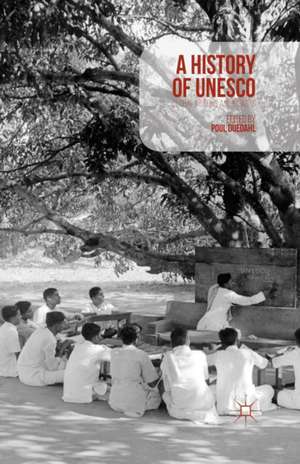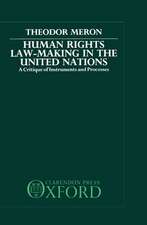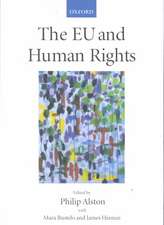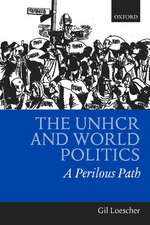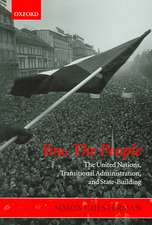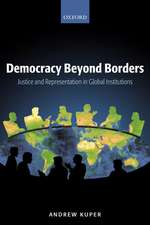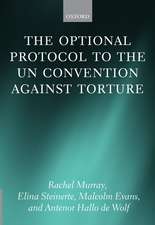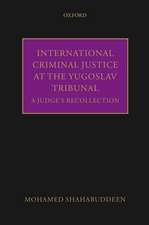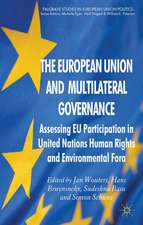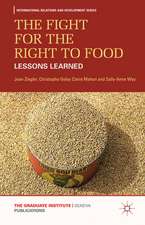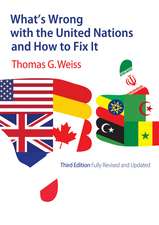A History of UNESCO: Global Actions and Impacts
Editat de Poul Duedahlen Limba Engleză Paperback – 3 apr 2018
| Toate formatele și edițiile | Preț | Express |
|---|---|---|
| Paperback (1) | 454.16 lei 6-8 săpt. | |
| Palgrave Macmillan UK – 3 apr 2018 | 454.16 lei 6-8 săpt. | |
| Hardback (1) | 588.83 lei 6-8 săpt. | |
| Palgrave Macmillan UK – 4 feb 2016 | 588.83 lei 6-8 săpt. |
Preț: 454.16 lei
Nou
Puncte Express: 681
Preț estimativ în valută:
86.91€ • 90.62$ • 72.23£
86.91€ • 90.62$ • 72.23£
Carte tipărită la comandă
Livrare economică 21 martie-04 aprilie
Preluare comenzi: 021 569.72.76
Specificații
ISBN-13: 9781349845286
ISBN-10: 1349845280
Pagini: 338
Ilustrații: XII, 338 p.
Dimensiuni: 140 x 216 mm
Greutate: 0.41 kg
Ediția:1st ed. 2016
Editura: Palgrave Macmillan UK
Colecția Palgrave Macmillan
Locul publicării:London, United Kingdom
ISBN-10: 1349845280
Pagini: 338
Ilustrații: XII, 338 p.
Dimensiuni: 140 x 216 mm
Greutate: 0.41 kg
Ediția:1st ed. 2016
Editura: Palgrave Macmillan UK
Colecția Palgrave Macmillan
Locul publicării:London, United Kingdom
Cuprins
1. Introduction: Out of the House: On the Global History of UNESCO, 1945-2015; Poul Duedahl
PART I: ROUTES OF KNOWLEDGE
2. Popularizing Anthropology, Combating Racism; Edgardo C. Krebs
3. Weapons of Mass Distribution: UNESCO and the Central Role of Books; Céline Giton
4. And Action!: UN and UNESCO Coordinating Information Films, 1945-1951; Suzanne Langlois
PART II: REBUILDING A WORLD DEVASTATED BY WAR
5. Child Victims, UNESCO and the Promotion of International Model of Children's Communities after World War II; Samuel Boussion, Mathias Gardet and Martine Ruchat
6. Returning to the International Community: UNESCO and Postwar Japan, 1945-1951; Takashi Saikawa
7. Pursuing Peace through a 'Library-Minded' World; Miriam Intrator
PART III: EXPERTS ON THE GROUND
8. UNESCO's Fundamental Education Program 1946-1958: Vision, Actions and Impact; Jens Boel
9. Education for Independence: UNESCO in post-colonial Congo; Josué Mikobi Dikay
10. The flow of UNESCO experts towards Latin America: On the asymmetrical impact of the missions, 1947-1984; Anabella Abarzúa Cutroni
PART IV: IMPLEMENTING PEACE IN THE MINDS
11. UNESCO Teaches History: Implementing International Understanding in Sweden; Thomas Nygren
12. UNESCO and the Improvement of History Textbooks in Mexico, 1945-1960; Inés Dussel & Christian Ydesen
13. UNESCO's Role in East Asian Reconciliation: Postwar Japan and International Understanding; Aigul Kulnazarova
PART V: PRACTICING WORLD HERITAGE
14. UNESCO and the Shaping of Global Heritage; Aurélie Elisa Gfeller & Jaci Eisenberg
15. Safeguarding Iran and Afghanistan: On UNESCO's Efforts in the Field of Archaeology; Agnès Borde Meyer
16. UNESCO and Chinese Heritage: An Ongoing Campaign to Achieve World-Class Standard; Celine Lai
PART I: ROUTES OF KNOWLEDGE
2. Popularizing Anthropology, Combating Racism; Edgardo C. Krebs
3. Weapons of Mass Distribution: UNESCO and the Central Role of Books; Céline Giton
4. And Action!: UN and UNESCO Coordinating Information Films, 1945-1951; Suzanne Langlois
PART II: REBUILDING A WORLD DEVASTATED BY WAR
5. Child Victims, UNESCO and the Promotion of International Model of Children's Communities after World War II; Samuel Boussion, Mathias Gardet and Martine Ruchat
6. Returning to the International Community: UNESCO and Postwar Japan, 1945-1951; Takashi Saikawa
7. Pursuing Peace through a 'Library-Minded' World; Miriam Intrator
PART III: EXPERTS ON THE GROUND
8. UNESCO's Fundamental Education Program 1946-1958: Vision, Actions and Impact; Jens Boel
9. Education for Independence: UNESCO in post-colonial Congo; Josué Mikobi Dikay
10. The flow of UNESCO experts towards Latin America: On the asymmetrical impact of the missions, 1947-1984; Anabella Abarzúa Cutroni
PART IV: IMPLEMENTING PEACE IN THE MINDS
11. UNESCO Teaches History: Implementing International Understanding in Sweden; Thomas Nygren
12. UNESCO and the Improvement of History Textbooks in Mexico, 1945-1960; Inés Dussel & Christian Ydesen
13. UNESCO's Role in East Asian Reconciliation: Postwar Japan and International Understanding; Aigul Kulnazarova
PART V: PRACTICING WORLD HERITAGE
14. UNESCO and the Shaping of Global Heritage; Aurélie Elisa Gfeller & Jaci Eisenberg
15. Safeguarding Iran and Afghanistan: On UNESCO's Efforts in the Field of Archaeology; Agnès Borde Meyer
16. UNESCO and Chinese Heritage: An Ongoing Campaign to Achieve World-Class Standard; Celine Lai
Recenzii
“Duedahl (Aalborg Univ., Denmark) has gathered a highly knowledgeable cadre of international scholars and experts in the field to write this comprehensive overview of the work of UNESCO. … For scholars of the effects of globalization and the efforts of the UN in the post–WW II world. Summing Up: Recommended. Graduate students and above.” (M. W. Quirk, Choice, Vol. 54 (5), January, 2017)
Notă biografică
Poul Duedahl is Professor of History at the Department of Culture and Global Studies at Aalborg University, Denmark, and Director of the Global History of UNESCO Project sponsored by the Danish Council for Independent Research. He received the History Book of the Year Award in Denmark in 2013.
Textul de pe ultima copertă
The mission of the United Nations Educational, Scientific and Cultural Organization (UNESCO), as defined just after the end of World War II, is to construct intellectual and moral solidarity in order to build 'the defenses of peace' in the minds of men and women. The Organization has therefore carried out a considerable amount of mental engineering.
Historians have so far uncovered the roots of many of the soft power initiatives launched to construct sincere solidarity between people, but we still know very little about their impact. In this publication, leading historians within the field trace the routes of selected initiatives from the center to the periphery – from UNESCO's headquarters in Paris to the member states – to assess UNESCO's global impact from World War II and up till today.
Historians have so far uncovered the roots of many of the soft power initiatives launched to construct sincere solidarity between people, but we still know very little about their impact. In this publication, leading historians within the field trace the routes of selected initiatives from the center to the periphery – from UNESCO's headquarters in Paris to the member states – to assess UNESCO's global impact from World War II and up till today.
